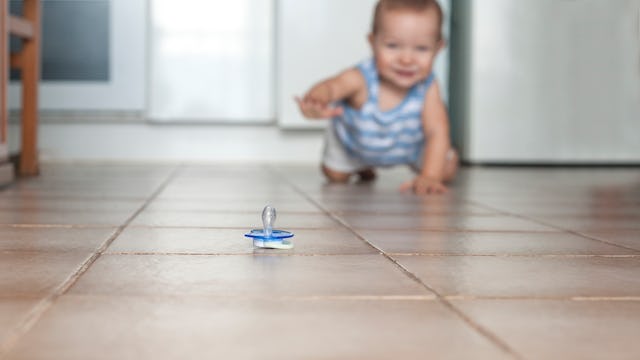Sucking Your Baby's Pacifier Might Actually Protect Them From Allergies

Don’t feel ashamed for sucking on your baby’s pacifier to clean it off — you might be helping them out with allergies
Come on. You know you’ve done it. Well, probably not with the first kid, but most seasoned parents with pacifier addict babies have sucked on that binky after it fell on the floor to clean it off. We can’t always get to a faucet to wash it, and it might be a little gross, but it’s definitely preferable to a meltdown in the toothpaste aisle at Target. But most parents might not realize that avoiding a tantrum is only one positive result of slobbering on their kid’s paci.
It can also protect them from developing allergies.
It’s true. According to CNN, a new study conducted by Dr. Eliane Abou-Jaoude, an allergy fellow with the Henry Ford Health System in Detroit, sucking the yucky off your baby’s binky can confer some serious benefits on the little tyke. It can possibly help lower a baby’s levels of IgE antibody, a troublesome allergy-causing protein.
Abou-Jaoude said, “The idea is that the microbes you’re exposed to in infancy can affect your immune system’s development later on in life.” Therefore, if a parent passes on those microbes to their baby, it can help their immune system later on.
Out of 74 infants studied, nine of them had their binkies “cleaned” by mom’s saliva. But compared to the rest of the kids, those nine had much lower levels of IgE antibody, a trend starting when the babies were 10 months old.
Parental saliva isn’t the only microbe source proven to help prevent allergies in kids. Living near livestock, being born vaginally and passing through the birth canal full of microbes, and not having dishes cleaned in a dishwasher are all factors that studies have shown can mean less allergies later in life.
Basically, modern parents are possibly going a *bit* too far with the desire to super sanitize all the things. Some dirt and germs are good so kids develop strong immune systems — which can mean warding off allergies.
Dr. Andrew MacGinnitie, clinical director of the Division of Immunology at Boston Children’s Hospital, says that the study is “one more piece of data that early exposure to microbes helps prevent allergies.” MacGinnitie does note that the study, which isn’t peer-reviewed yet, has some flaws. It was small and he says there could be other factors that made the babies whose parents sucked on their binkies less likely to have allergies. “It’s possible that sucking on a pacifier is correlated with other, more important factors that predispose or protect against allergens,” he said. The moms who sucked on their baby’s pacifier might also “let their kids play in the dirt, or their whole house could be less clean.”
He notes that there really aren’t many risks to a parent’s saliva coming into contact with their child’s pacifier. “If the kid were sick, he or she could transmit an infection to the mom or dad, but if the kid is well, this would seem to be unlikely,” MacGinnitie says. He also mentions that the binky hitting the floor isn’t the worst thing ever saying, “in general, the bacteria and viruses on the floor don’t cause disease.”
The babies were tracked until 18 months old, but researchers still think the results are noteworthy. “Based on these levels, you can’t really tell what’s going to happen to these kids in the future,” Abou-Jaoude said. “All is we know is, people with allergies, they usually have higher levels of IgE antibodies. But that doesn’t mean that if you have high IgE, you’re definitely going to have allergies.”
Abou-Jaoude is presenting her findings this weekend at the American College of Allergy, Asthma, and Immunology Annual Scientific Meeting. So if someday soon your pediatrician asks if you’re making sure to suck your baby’s pacifier after it gets dirty, know you’ll know why.
This article was originally published on